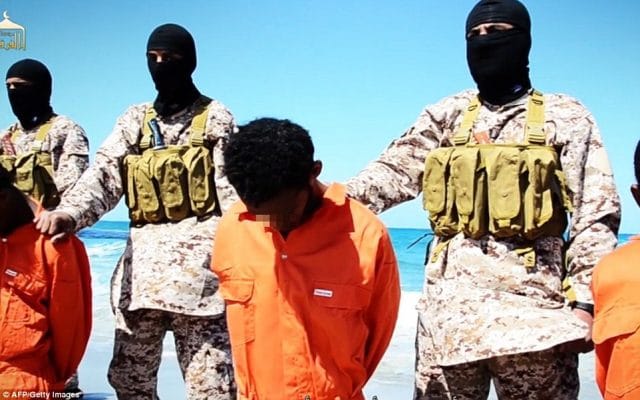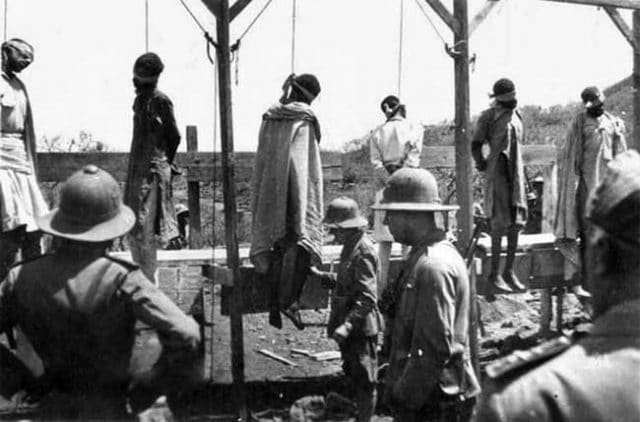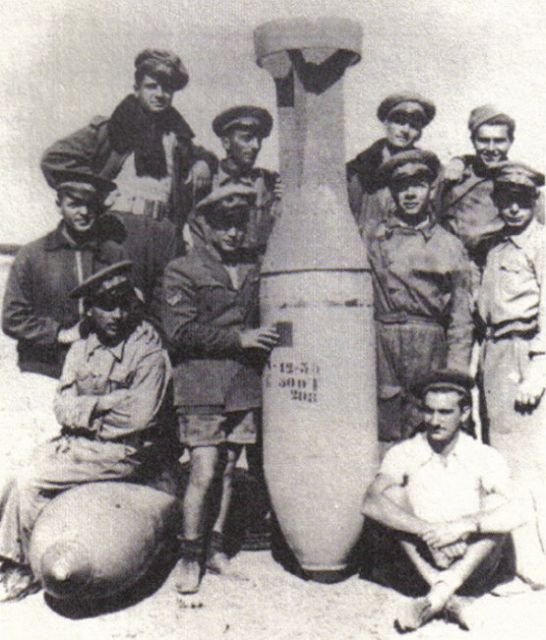The Genocide Of Ethiopian Christians: Muslims Haven’t Been The Culprits

Many of us who follow the “non-mainstream media” have become acquainted with the unfortunate persecutions of Christians and religious minorities in the Middle East and in Nigeria at the hands of Islamists. Recently, another unknown region in sub-Sahara Africa, Ethiopia, has become the latest country in which Christians are being targeted for their faith.
Reports estimate that as many as fifty-thousand people have been displaced by Oromo nationalists — an ethnic group in Ethiopia that is predominantly Muslim. The majority of those who get killed in a brutal way (beheaded and mutilated) are Orthodox Christians of Amhara ethnicity. Last August, as reported by the Barnabas Fund, more than 500 Ethiopian Christians, including pregnant women, children and whole families, were slaughtered by Oromo Muslims — this hidden genocide has been going on for years.
This is not the first time Ethiopian Christians have had to undergo atrocities because of their religious beliefs.

(Photo: tigraionline.com)
October 3 marks the 85th anniversary of the Italian invasion of Ethiopia — also called Abyssinia. In what was the beginning of a six-year occupation, the Italians under Benito Mussolini exterminated approximately one million Ethiopian Tewahedo Orthodox Christian men, women and children, in addition to destroying 2,000 churches and 525,000 homes.
According to tradition, Ethiopia was first evangelized by the Apostle Mathew and the first Ethiopian convert is thought to have been the eunuch in Jerusalem mentioned in the Acts of the Apostles 8, 27-40; King Ezana declared Christianity the official religion of Ethiopia, at that time called Axum, c. 330 AD. — this preceded the Roman Empire which only adopted the Christian faith in 380 AD under the Emperor Theodosius I.

As I explain in my book Ethiopian and Eritrean Monasticism: The Spiritual and Cultural Heritage of Two Nations, what made this atrocity worse than the Armenian genocide during World War I, in which over one million Armenians and other ethnic Christians were killed by the Ottoman Turks, is that Mussolini’s operations had the complicit approval of most of the Italian Catholic hierarchy during the reign of Pope Pius XI.
As Dr. Giovanni Pallanti, author of Elia dalla Costa: Il Cardinale della carità e del coraggio (Elia dalla Costa: The Cardinal of Charity and Courage) and professor at the Faculty of Theology of Tuscany, the Italian hierarchy not only blessed the departing regiments and their colors, but also delivered war-mongering speeches, wrote circular letters justifying the war and protested against the League of Nations and Great Britain for imposing sanctions against Italy.
Some of the notable members of the Catholic hierarchy who promoted the hawkish politics of Mussolini were:
- the Archbishop of Taranto, Ferdinando Bernardi, who on February 23, 1936 said: “The Italian victory would open Ethiopia, a country of infidels and schismatics, to the expansion of the Catholic faith; therefore the war against Ethiopia should be considered as a holy war, as a crusade.”
- the Bishop of San Miniato, Ugo Giubbi, who assured Mussolini “for the victory of Italy, the Italian clergy are ready to melt down the gold of the churches and the bronze of the bells.”
- the Cardinal Archbishop of Milan, Alfredo Ildefonso Schuster, who, speaking in his Cathedral on October 28, 1935, praised the Italian army as: “The gallant army which, in fearless obedience to the command of the fatherland, is opening the gates of Ethiopia to the Catholic faith and the Roman civilization.”
Catholic officials in Abyssinia had one goal in mind, to exploit a conquered Ethiopia in order to bring such “heretics” — the Ethiopian Christians — into the Catholic Church. Ironically, this was opposed by some of Mussolini’s government officials. They went so far as to beseech Pope Pius XI to recall to Italy the Apostolic Delegate to Ethiopia and Apostolic Vicar of Addis Ababa Monsignor Emilio Castellani, who likewise sought to impose Roman Catholicism on the Orthodox.
Pallanti explains that when the Mussolini regime called for the repatriation of Castellani, Vatican Secretary of State Cardinal Eugenio Pacelli — the future Pope Pius XII — opposed the request since he was also convinced that it was necessary to try to convert Ethiopian Tewahedo Christians to Catholicism, further igniting the presence of fascist Italy in that nation. This had been attempted by he Jesuit Portuguese Patriarch of Ethiopia Alfonso Mendes who, in the 17th century, tried to force Catholicism on the Ethiopians, only to divide a Christian nation and have the Church of Rome expelled from Abyssinia.
General Graziani — The Butcher of Ethiopia
The genocidal acts committed by the Italians included the use of mustard gas, the bombing of Red Cross hospitals and ambulances, the execution of captured prisoners without trial and the shooting of “witch-doctors” accused of prophesying the end of Fascist rule.
The main Mussolini thug responsible for orchestrating the genocide was the Butcher of Ethiopia, the Viceroy General Rodolfo Graziani.

One of the most infamous acts of Graziani occurred on May 20, 1937, when he ordered Italian troops to murder 270 monks of the ancient Monastery of Debre Libanos, as well as a large number of pilgrims who had traveled there to celebrate the feast day of the founding saint of the monastery. Its treasures were looted and taken to Italy.
This massacre was not simply an act of aggression toward the Ethiopian Tewahedo Orthodox Church for supporting the Emperor Haile Sellassie but against one of the pillars of Ethiopian identity as the last Christian empire in the world — the then-British empire, while having a Protestant monarchy, administered a secular government.
Graziani was replaced as Viceroy of Ethiopia by Prince Amedeo in 1937. After the Italians declared war against the United Kingdom, the British launched a counter-invasion in Ethiopia in January 1941; they pulled out altogether from Abyssinia later that year. Graziani was convicted for war crimes in 1948. He received a sentence of 19 years’ imprisonment, of which he served only two years; he died in 1955.
In 2012, the Italian state built a mausoleum and memorial park in his honor in the village of Affile, south of Rome. The town mayor, Ercole Viri, as well as some state officials, were present for its opening ceremony. Viri exalted the “importance of the sacrifice” Graziani gave for his country and dismissed his criticisms of the Butcher of Ethiopia as “idle chatter.”
Why did Pope Pius XI Tolerate the War?

Many have sustained that Pius XI blessed the Italian onslaught because he wanted to expand Roman Catholicism in Abyssinia. It is true that the Pope publicly observed neutrality in application of Article 24 of the Lateran Treaty of 1929 — it established the Vatican as a sovereign state, financially compensating for what had been lost by the Papal States in 1870; the church was granted extensive privileges (status of a state religion, religious education and the recognition of Church marriage). If the pope were to betray this neutrality, the Vatican City State could have been forced to forfeit its sovereignty and independence. Neutrality, however, does not mean indifference, and the Pope and Vatican diplomats concerned themselves over the consequences of the would-be Italian campaign in Ethiopia.
Pius XI initially saw an ally in Mussolini. The Pontiff did not, for example, publicly protest against the nationwide collection of wedding rings that were melted-down in support of the conquest of Abyssinia, which was contrary to international law. Nevertheless, relying heavily on Cardinal Pacelli, who distrusted democracy, equating it with socialism, atheism and communism, the pope believed a fascist government was the best way to ensure peace and stability in Italy.
Pius XI eventually recognized his mistake, acknowledging that his attempt to utilize the fascist regime for the Catholic cause had failed: “What a lout and traitor Mussolini was to me!” Conversely, Mussolini realized that he could not domesticate the Church and that he had bitten his teeth out especially at Pius XI, the “most harmful pope of all time.”
Notwithstanding going against his own Cardinal Secretary of State and the majority of the Italian hierarchy, on October 23, 1938, the pope told his aid Father Pietro Tacchi Venturi: “I am ashamed of being Italian. And you, Father, please tell Mussolini! Not as Pope but rather as an Italian, I am ashamed of myself! The Italian people has become a flock of stupid sheep. I shall speak out, I will not be afraid. I am impelled by the Concordat [Lateran Treaty], but even more by my conscience… I am truly saddened, as Pope and as an Italian.”
Let us pray that this dark period in history will officially be recognized by both the Italian government and the Church of Rome, which simultaneously may encourage other heads of state to acknowledge and stop the present-day genocide of Ethiopian Christians by their Muslim co-nationals.
__________________________________________________

Mario Alexis Portella is a priest of the Cathedral of Santa Maria del Fiore and Chancellor of the Archdiocese of Florence, Italy. He has a doctorate in canon law and civil law from the Pontifical Lateran University in Rome; he also holds a M. A. in Medieval History from Fordham University, as well as a B.A. in Government & Politics from St. John’s University. He is also author of Islam: Religion of Peace? – The Violation of Natural Rights and Western Cover-Up.

- Sources not cited may be found in my book Ethiopian and Eritrean Monasticism: The Spiritual Heritage of Two Nations. Book available on Amazon.






Recent Comments